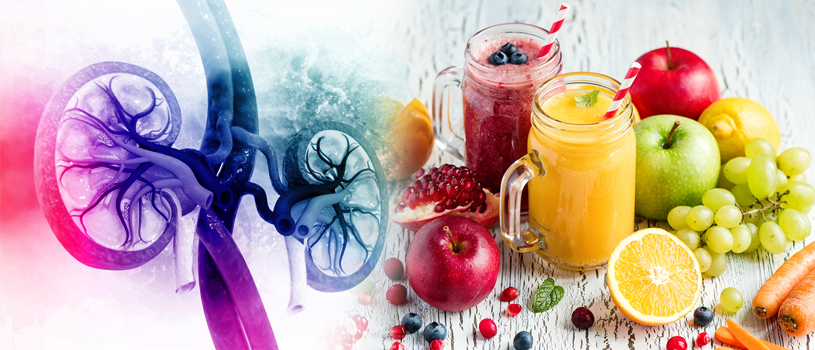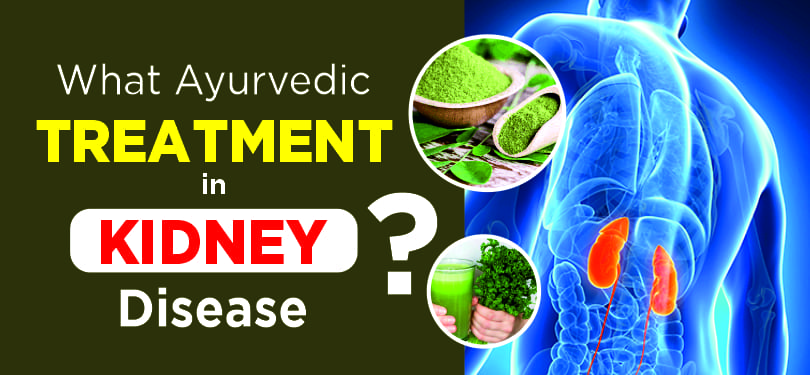Ayurvedic treatment for kidney diseases has helped people recover from kidney diseases for ages. Ayurveda suggests a diet specific to conditions and simple lifestyle changes that help you recover fast.
Diabetes, hypertension, autoimmune diseases, cysts, stones etc., are a few causes of kidney failure. When a person has renal failure, there are some guidelines that one should follow. One should treat the underlying cause appropriately. Following the required diet is of utmost importance.

Diet in Ayurvedic Kidney Diseases
If diabetes is the cause of kidney failure, follow an anti-diabetic diet. If hypertension is causing renal failure, follow a low-sodium, blood pressure-regulating diet. There is no one particular diet for renal disease patients. But, one must obey suggested considerations, as per the disease symptoms. An Ayurvedic diet can help you save and recover from Kidney disease. In a few difficult cases, ayurvedic medicines can be of great help too.
Dialysis is an artificial method of doing part of the kidneys’ tasks. It cannot take the place of the kidney’s normal operations. You must regulate your kidney diet if you are receiving dialysis. Dialysis and transplant patients can benefit from dietary advice. Kidney patients should avoid consuming too much protein since this can raise urea and creatinine levels. Aim to limit your intake of vitamins or greens. The potassium levels may rise as a result. The advice would be on potassium, phosphate, and salt levels as well. You can continually improve by quitting smoking, eating well, and exercising. If you are overweight, these actions will also assist you in losing weight.
For those receiving dialysis, obesity can result in practical issues. Undernourished people lose weight and muscular mass. Patients receiving dialysis run the risk of developing malnutrition. People experiencing loss of appetite can eat frequently to avoid malnutrition.
Overweight should get help from a nutritionist. Reversing obesity won’t prevent kidney failure. It will indeed have a positive impact on your health. One should pay close attention to the specific kidney diet and nutrition factors. Precautions are on intake of iron, phosphate and calcium, potassium, protein, etc.

Protein
Protein is crucial for the body’s ability to repair and create muscles. It also aids the body’s defence against infection. Meat, fish, dairy products, eggs etc., are the primary protein sources for non-vegetarians. For vegetarians, peas, beans, and lentils are good protein sources. Low protein levels could result in malnutrition, fluid retention, and low immunity.
When the body uses protein, it produces creatinine. Urine is one of these wastes. Normal, healthy kidneys also eliminate urea. Persons with renal disease should nonetheless eat protein in the necessary amount. It’s crucial to heed your dietitian’s recommendations about your protein intake.
Potassium
The heart may stop pumping if blood potassium levels are too high. Arrhythmias may result from low potassium levels. Patients on haemodialysis may need to avoid foods high in potassium. Potassium-rich foods are chocolates, bananas etc. Patients undergoing peritoneal dialysis hardly ever need to limit their potassium intake.
Sodium
Patients undergoing hemodialyzation face more severe fluid intake limitations than peritoneal dialysis. Hence, must carefully monitor salt intake.
Iron
Anaemia affects a large number of kidney failure patients. Low body iron levels are one of the factors that contribute to anaemia. You might need to take medication if you have low levels of iron.
Phosphorus and Calcium
Calcium and phosphorus affect bone health. Renal failure patients usually have too little calcium and too much phosphate. Raising calcium levels and reducing phosphate levels (blood) are the goals for treatment. Thus, reduce phosphate-rich foods in your diet. You might also need to take a phosphate binder with meals. It is challenging to reduce phosphate intake without reducing protein intake.
Vitamins
Dialysis creates a loss of vitamins B and C in your body. Your doctor might suggest tablets containing vitamin supplements.

Using Ayurvedic medicines for Kidney Diseases
Our modern system of medicine is helping with a lot of effort put into kidney patients. The treatment procedure is still not able to cure kidney diseases. In cases where conditions are not getting controlled by diet and lifestyle modifications, Ayurvedic kidney disease treatment should be followed. This ancient science considers humans as a part of the environment they are living in. In case of diseases, one can get treatment from the herbs found in their environment. Ayurveda suggests punarnava, varuna, tribulus, shigru, apamarg etc., to treat kidney patients. These herbs work wonders to revive renal failure. These are also helpful in minimising oedema and decreasing uremic symptoms. Within a few days of regular medicine, the kidney failure patient improves. There are no chemicals or preservatives in these products, as these are only made of herbs.
Thus, we can say that the kidneys can be treated with ayurvedic medicines.

